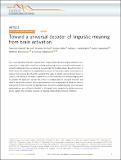Toward a universal decoder of linguistic meaning from brain activation
Author(s)
Pereira, Francisco; Lou, Bin; Ritter, Samuel; Gershman, Samuel J.; Botvinick, Matthew; Pritchett, Brianna L; Kanwisher, Nancy; Fedorenko, Evelina G; ... Show more Show less
Downloads41467-018-03068-4.pdf (3.168Mb)
PUBLISHER_CC
Publisher with Creative Commons License
Creative Commons Attribution
Terms of use
Metadata
Show full item recordAbstract
Prior work decoding linguistic meaning from imaging data has been largely limited to concrete nouns, using similar stimuli for training and testing, from a relatively small number of semantic categories. Here we present a new approach for building a brain decoding system in which words and sentences are represented as vectors in a semantic space constructed from massive text corpora. By efficiently sampling this space to select training stimuli shown to subjects, we maximize the ability to generalize to new meanings from limited imaging data. To validate this approach, we train the system on imaging data of individual concepts, and show it can decode semantic vector representations from imaging data of sentences about a wide variety of both concrete and abstract topics from two separate datasets. These decoded representations are sufficiently detailed to distinguish even semantically similar sentences, and to capture the similarity structure of meaning relationships between sentences.
Date issued
2018-03Department
Massachusetts Institute of Technology. Department of Brain and Cognitive Sciences; McGovern Institute for Brain Research at MITJournal
Nature Communications
Publisher
Nature Publishing Group
Citation
Pereira, Francisco et al.“Toward a Universal Decoder of Linguistic Meaning from Brain Activation.” Nature Communications 9, 1 (March 2018): 963 © 2018 The Author(s)
Version: Final published version
ISSN
2041-1723